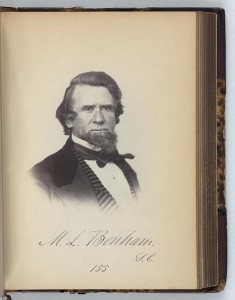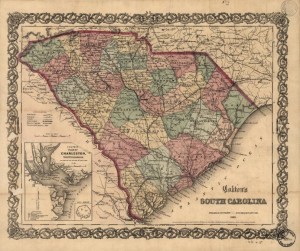In a message to the state legislature South Carolina governor Milledge Luke Bonham identified several reasons for food shortages in his state: the law prohibiting liquor production was not being obeyed or enforced; the law limiting cotton production to three acres was actually encouraging farmers who had no plans to grow cotton to plant up to the limit because the legislature apparently deemed it patriotic to do so; speculators were inflating the price of grain by buying it and either holding it off the local market or exporting it. All of this especially injured those families whose “producing force is in the army” because they were less able to supply their own food.
From the Richmond Daily Dispatch April 10, 1863:
Message of the Governor of South Carolina.
An extra session of the South Carolina Legislature, called by the Governor, commenced at Columbia on Monday. The Governor, in his message, says that the distillation of spirits from the cereal grains of the State, though prohibited by law, is yet a great and growing evil, and seriously felt in the grain-growing districts. With relation to the cotton crop and speculation he says:
It is much feared, that while your act to limit the production of cotton to three acres to the full hand will restrain such as having overflowing granaries, contemplate withholding their grain from market and planting cotton almost exclusively, it has yet induced many, as I am informed, who purposed planting little if any cotton, to plant the full number of acres allowed by law. And this is justified upon the ground that your statute is equivalent to an announcement by the chosen representatives of the people that such a course is not unpatriotic. If this feeling prevails extensively it will be readily perceived what must be the result. All fertilizers will be put on the cotton lands to stimulate them to the highest production, while the corn lands will be thus proportionately impoverished. In my first message in January last, in commending to your favorable consideration the Georgia law, I recommended the reduction of the number of acres below three. With the lights now before me I recommend an amendment of your act, so as to prohibit the planting over a half, or, at most, one acre to the full hand and that the hands to be enumerated shall only be such as work in the crop. I invite your first attention to this subject, and recommend, in the event a further restriction is imposed, that the two Houses ratify the act immediately after its passage.
The spirit of speculation has recently made such alarming strides in this State as to render your interposition necessary to arrest the evil.–Large sums are invested in flour, corn, bacon, and other articles of prime necessity, to the monopoly, almost, of such articles in certain sections of the country, and they are withheld from market, or exported beyond the limits of the State, to the great enhancement of prices, and to the manifest injury of consumers, especially the families of those whose producing force is in the army. Under these circumstances, I have called into exercise the power conferred upon me by the Constitution, to prohibit, for thirty days, the exportation of provision from the State, but with some modifications which I felt were due to our sister States and the Confederate Government. I have not gone, so far, beyond the retention of these articles within the limits of the State, and your action is requisite to enable me to carry fully into effect this clause of the Constitution, as also to continue the prohibition without interruption, if you should deem it advisable. I recommend the passage of an act which will authorize the Governor, through proper agents, to dispose, at their market value, such articles as have been or may be seized in transitu and after paying all expenses incurred out of the proceeds to retain a certain proportion, to be distributed among the Soldiers’ Boards of Relief, the remainder to be returned to the owner — or such other appropriate legislation as you may deem better adapted to the case. I also recommend that you adopt some legislation to arrest the purchase and monopoly of articles of prime necessity, even when it is not intended to export them beyond the limits of the State. The monopoly and withholding from market of supplies is most detrimental to the true interests of the whole country, now involved in such a war as has not been seen in modern times.


